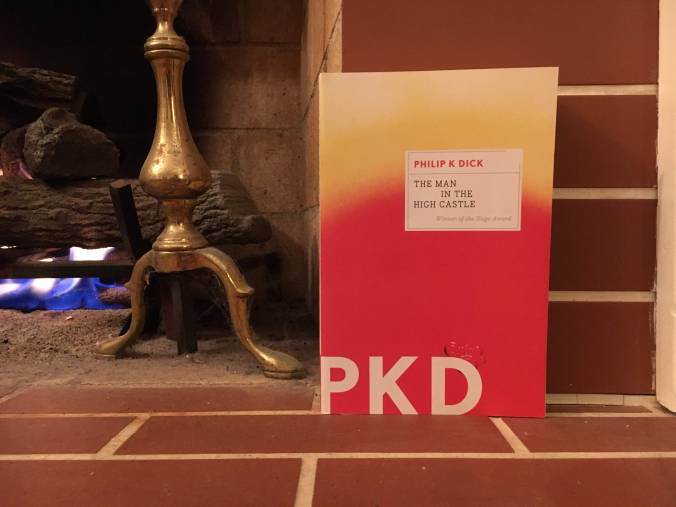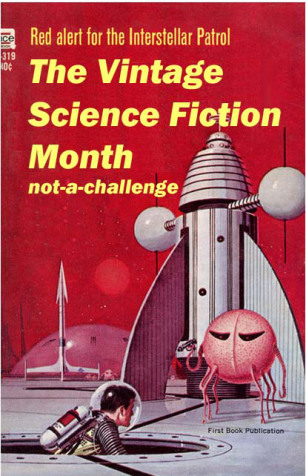
For Vintage Science Fiction Month this year I decided to read The Man In The High Castle by Philip K. Dick. If you’ve never heard of Vintage Science Fiction Month, it’s a month (January) dedicated to reading, watching, blogging, or talking about anything vintage science fiction. There isn’t a hard and fast rule for what makes it “vintage” but a general guideline is if it was created in 1979 or earlier then you’re good. Some people will just choose something created before their birth year. The rules aren’t hard and fast. The point is to have fun.
Vintage Science Fiction Month was started by Andrea over at the Little Red Reviewer and is now co-hosted by Jacob over at Red Star Reviews. There’s also a Twitter account you can follow @VintageSciFi_.

I’d been eyeing some of Philip K. Dick’s books for some time and decided this was the year to read one. If you don’t know about his works he’s the author of such acclaimed stories as Do Androids Dream of Electric Sheep (adapted as the movie Blade Runner), Total Recall, and Minority Report among many others. Amazon adapted The Man In The High Castle in 2015 and it has now run through its fourth season. It was the Amazon show which really got me interested in the book. I’ve watched season one and was curious how the two compare. The book also won the Hugo award in 1962.
If you don’t know the basic premise here it is…
“It’s America in 1962. Slavery is legal once again. The few Jews who still survive hide under assumed names. In San Francisco, the I Ching is as common as the Yellow Pages. All because some twenty years earlier the United States lost a war and is now occupied by Nazi Germany and Japan.
This harrowing, Hugo Award-winning novel is the work that established Philip K. Dick as an innovator in science fiction while breaking the barrier between science fiction and the serious novel of ideas. In it Dick offers a haunting vision of history as a nightmare from which it may just be possible to wake.” – Goodreads blurb
So yeah, basically it’s an alternate history where the U.S. and the Allies lost WWII. The Pacific States are occupied by Japan, much of the East and Midwest is occupied by the Nazi’s, the South is it’s own country again, and there’s the Mountain states which are closely affiliated with Japan but independent.
The book is set in post-war San Francisco and the Mountain States. There are multiple POV characters including Robert Childan, a dealer in Amerian Antiques; Frank Frick, a Jewish craftsman who is ex-military and has made a living forging antiques, Nobusuke Tagomi, a Japanese trade official, and Julianna Frick, Frank’s ex-wife who is a judo instructor in the Mountain States. Their stories are somewhat intertwined. Childan is trying to increase his standing in Japanese run society, Frank is trying to get by after Julianna left him and wants to go into business for himself, Toagomi is presented with a strange political problem he must help resolve, and Julianna takes a strange trucker for a lover who wants to visit an author in the mountains.
That author happens to have written a book called The Grasshopper Lies Heavy, an alternate history of the war in which the allies won. But…it’s not the history we all know as true. They won in this version but it still turns out differently. It’s a book within a book.
The characters in the novel are heavily influenced by Japanese ideas and culture – at least as it has rubbed off on an occupied America. The I Ching or Tao Oracle plays a prominent role in the way the characters make decisions and approach the world.
At the same time there are political happenings in Nazi Europe that impact events in the States.
That’s about all I can say without giving away the plot except that if you’ve seen the show there are some early similarities but the book and Amazon depiction diverge a lot. At 274 pages it’s a quick read and you’re done before you know it. As the Goodreads blurb indicated it’s a little bit science-fiction and a little bit literary-fiction as a philosophical novel of ideas. In it Dick explores not just the idea of alternate history, but seriously wants to ask questions about truth and reality. What is truth? What is reality? What is history? Is our history and present the only true and real one? How is that determined and by whom or what?
It also explores culture and race. There’s a lot of racist thought and language expressed by the characters which given the historical context fits though it is still unsettling at times. This is most striking in depictions of Asians and Jews in the mind of the American characters especially as well as the Germans. There are specific characters who come off as very unlikable such as Robert Childan who perhaps holds the most deep seated bigotry of them all.
The Man In The High Castle had a lot going for it. Unfortunately I just never seemed to care. I didn’t care about the characters. I didn’t care about the story. I didn’t care about…well…any of it. I WANTED to care but it never hooked me; it never drew me in.
I was only remotely drawn to one character, that of Tagomi. But even with him I mostly just shrugged. The characters barely interacted with or impacted each other, and some never met at all. Some characters had absolutely no development. Some had almost no real impact on the story, to the point I couldn’t even figure out why they were in it.
The story had multiple plots going on. Each character was really a subplot of the larger narrative about the alternative history found in The Grasshopper Lies Heavy. But, only a couple of the subplots were really influential to the Grasshopper part of the narrative, and others could have been removed altogether with no real impact. As the story progresses I kept asking myself where it was going, what was the end point. When the book came to a close it just sort of ended, with no real closure for the various characters or the overall story. It ends with no real resolution.
Then there’s that whole book of ideas, philosophy thing. I really did like the way Dick was trying to frame the questions and the concepts of reality and truth and how they are determined and whether we can no either of them. But even this seemed to fail for me in the end. The climax of the book really hits on these themes but like I said above it just sort of fizzles out. Maybe Dick wasn’t trying to give us a nice pat answer; maybe he was trying to say we can’t really know for sure. But the way he ended it felt incomplete.
One last thought…I can’t speak to the accuracy of the use of the I Ching, or to the way Japanese thought and speech is depicted in the novel. It sounds like Dick knew what he was doing but that could totally just be my assumption as an ignorant American who doesn’t know anything about either. As I read I kept wondering about this and about how a Japanese reader would react. I’d love to see some feedback on this.
In the end I was very disappointed with The Man In The High Castle. Maybe my expectations were just too high going in. Whatever it was the book fell flat for me. I am apparently an outlier though because most readers seem to like it according to the ratings on Goodreads. This isn’t the end for me and Philip K. Dick however. I plan to read at least one more of his books before I firm up my opinion of him as an author. But this one won’t be on any of my recommendation lists.
2 of 5 Stars
Author: Philip K. Dick
Series: N/A
Publisher: Mariner Books
Publication Date: January 24, 2012 (originally published 1962)
Format: Paperback
Pages: 274
Wellllll, don’t expect much from any of his other books either. Dick was a druggie and wrote a lot of his stuff while on benders/whatever you call drug binges.
I think some of his stuff is worth reading just because of the impact it has had, but even that reason gets a bit thin for some of his stuff 🙂 Best of luck!
LikeLiked by 1 person
Shame you didn’t get on with this book. It’s a lot different to a bunch of his other stuff, which is much more Sci-Fi than alternate history and much less ‘literary’, so hopefully you enjoy some of his other stuff.
Do you have any ideas which of his books to try next?
LikeLike
I had a similar reaction to you, that ultimately I had trouble caring about anyone in the book. I liked how it started! Everyone seemed to be getting involved in interesting things! but the interesting things all seemed to fizzle. I did like the “book within a book” thing.
LikeLiked by 1 person